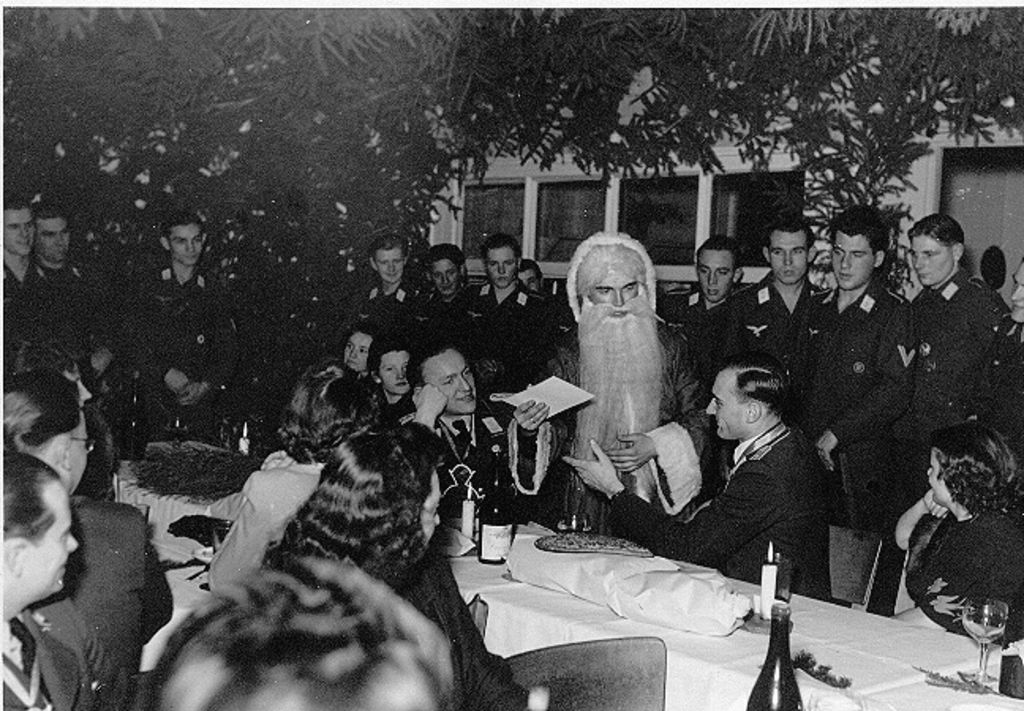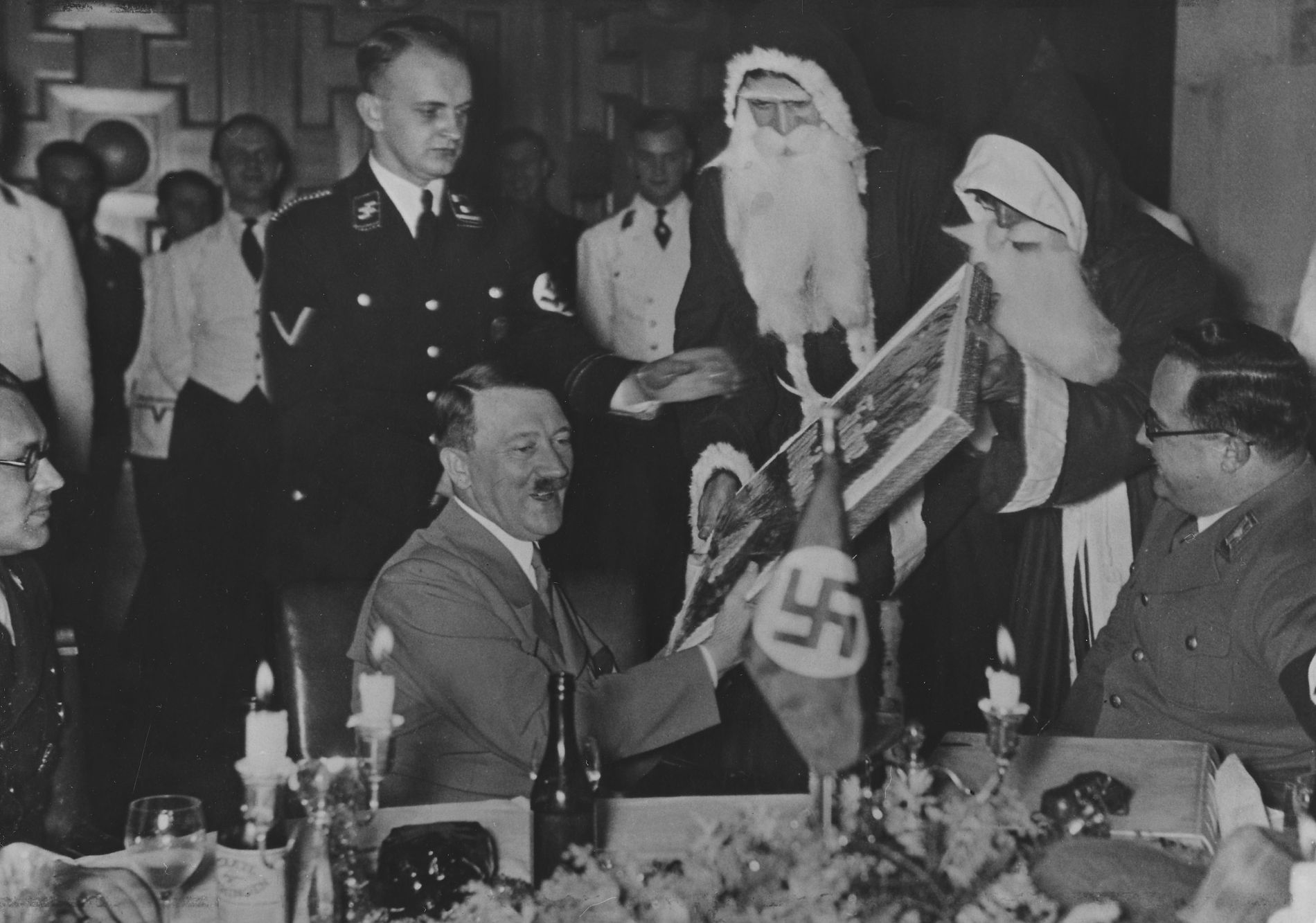It is true that a minority of Fascists saw Christianity as irredeemable and Semitic to the core, but others presented their own bizarre reinterpretations of scripture, and supposed parallels in Indo‐European religions, to ‘prove’ that Christianity had in fact been an ancient Aryan tradition all along. For example:
The völkisch thinkers Fritsch and Chamberlain maintained that the Old Testament derived from “the literatures and religions of older pre‐Jewish peoples of culture,” and that it drew on “old Aryan conceptions.”61 What should be retained from the Old Testament depended on the individual author, though most völkisch writers seem to have included the Prophets.
One of the greatest consequences was that this created parallel “Christianities”: one a perverted, “Jewish” understanding of Aryan religion that had conjoined the Old and New Testaments in their entirety and become orthodox faith—the other a religion that traced Aryan faith through the Bible to Jesus.
Steigmann‐Gall argues that neo‐pagans referring positively to Christianity indicated “ambiguity and ambivalence” in their views, but the situation was more complex than this. The belief that Christianity was a corruption of Aryan (pagan) faiths may well explain some of this apparent “ambivalence.”62
Wälsung’s articles were subsequently published in 1920 as a book by Lorenz Spindler Verlag, which simultaneously published Friedrich Döllinger’s Baldur and the Bible, a work that argued that much of the Old Testament was “Germanic” myth. Döllinger was one of the many pseudonyms of Karl Weinländer, who summarized his own views in Atlantis, the Edda, and the Bible (1922).63
He argued that Baldur and the Bible had demonstrated “that Jesus was not a Jew, but rather an Aryan, that therefore Christianity derives from an Aryan–Germanic source, and that the pre‐Jewish and allegedly Jewish culture of Palestine was Germanic”—in short, that paganism was Christianity. Exactly like Wälsung, Weinländer/Döllinger considered the “people of God” to be the “Aryans, Aramaens = Armanen” (Arier, Aramäer = Armanen): they were worshipers of the “light‐god” and were the “predecessors and successors of Christ.”64
Thus, many anticommunist neopagans were hardly as hostile to Christianity as one might expect:
Steigmann‐Gall posited a dichotomy in religious terms: he noted “the contested nature of religious meaning in [German Fascism],” but argued that the battle lines had been drawn between neo‐pagans and those who advocated an Aryan Christianity—referring to these respective groups as “paganists” and “positive Christians.”8 Although Steigmann‐Gall agreed that the neo‐pagans were a part of the [NSDAP], he questioned the extent to which they were truly anti‐Christian.9
[…]
Dietrich held that there had been an “obfuscation of the true sense of Christianity” because “non‐Aryan Priests” had “shrouded and mongrelized this Aryan–Christian faith,” just as “the mongrelized Rabbis of the judaized Israelites had made the hebraic version of the Edda (the Bible) into a Jewish book” by twisting whatever “did not fit with their racial soul, [but] without […] being able to touch the core, which, because it was of a pure Aryan spirit, was incomprehensible to them.”113
This article, with its pagan–Christian elements (the Edda as the Bible, the swastika as the cross), placed the [NSDAP] firmly within the esoteric völkisch tradition. In fact, Dietrich’s opinion was close to that of Döllinger: the Bible was “Aryan‐Germanic” pagan myth that had been misunderstood and misappropriated by the Jews. Once again, the Jews were not the Israelites.
If religion was an expression of race—which many Fascists believed—and if parallels could be found in Indo‐European faiths, then according to their logic it only followed that Christianity must have been Indo‐European as well, and not the product of a culture‐destroying race.
Nevertheless, many NSDAP officials sought to reduce the Christian elements in their celebrations of Christmas, or what they often called Julfest:
The report about the first Nazi Christmas was likely written by the paper’s editors, not Hitler, though it had every appearance of his approval: in fact, his own New Year’s greeting appeared just beneath it.99 The theme of the event was “to bring joy to poor children and to honor the Party.” Christ was not mentioned, and the report noted that the larger purpose of the celebration was to bring together “the loyal and worthy core of a movement to which the German future must belong.”100
The reason for this was the disastrous situation in postwar Germany, principally the revolutions of 1918–19: “All this the Edda and the teachings of the Armanen had already prophesied in ancient times.”101
Indeed, the paradise sought by the party was not the Christian one, but rather that of the Norse gods: “One day more happy times will come for the Aryan race—a new Idafeld.”102 The reference to the Edda clearly meant Ragnarok, or the “twilight of the gods.”103 The fact that this first Christmas event was held at solstice was consistent with the notions of sun‐worship underlying List’s work.
Pictured: Adolf Schicklgruber having fun at Julfest.
In fact, the Nazi Christmas of 1921 (actually held on January 9, 1922) was openly advertised as the celebration of pagan solstice:
The celebration of Christmas represents the most German of all celebrations. Through it our people have, since time immemorial, celebrated the great turning point in the annual cycle, the day on which the sun begins once more to constantly expand the height of its orbit in the sky, the day on which, in the midst of winter, the soul of the people is awakened once more by the yearning for a new spring.130

Pictured: A Fascist Christmas, featuring some sort of Nordic Santa Claus.
There was a consistent scarcity of references to Christianity throughout the Third Reich’s Julfest propaganda. For example, a Fascist published a short story that paralleled the Nativity story in several ways, but otherwise had no direct references to Christianity.
Many have interpreted this as evidence of the German Fascists’ overwhelming anti‐Christian sentiment, though it is likelier that the intention was to make Julfest more appealing to the non‐Christian Fascists. It is important to note that many Christians theirselves have declined to celebrate Christmas, recognizing it as mostly unbiblical, and some still refuse to celebrate it for the same reason. One has to question seeing signs of anti‐Christian sentiment in purifying a holiday that was hardly Christian to being with!
Lastly, I would like to clarify that I have no interest in condemning either Christians or neopagans by publishing this topic. Despite the façade, this has little to do with religion: a Catholic peasant in Guatemala would have found strikingly little in common with an upper‐class Catholic in the Reich, and I have met one Nordic neopagan (I don’t meet many neopagans in general) who explained to me that Nordic lore actually implies a positive view of miscegenation; neofascist neopagans are typically clueless of the lore and appropriate the faith simply for ultranationalist reasons.
Click here for events that happened today (December 25).
1941: The Axis acquired Hong Kong, and Axis trooped landed at Jolo, but Berlin sacked Heinz Guderian over conflicting visions on the strategy for war against the Soviet Union.


